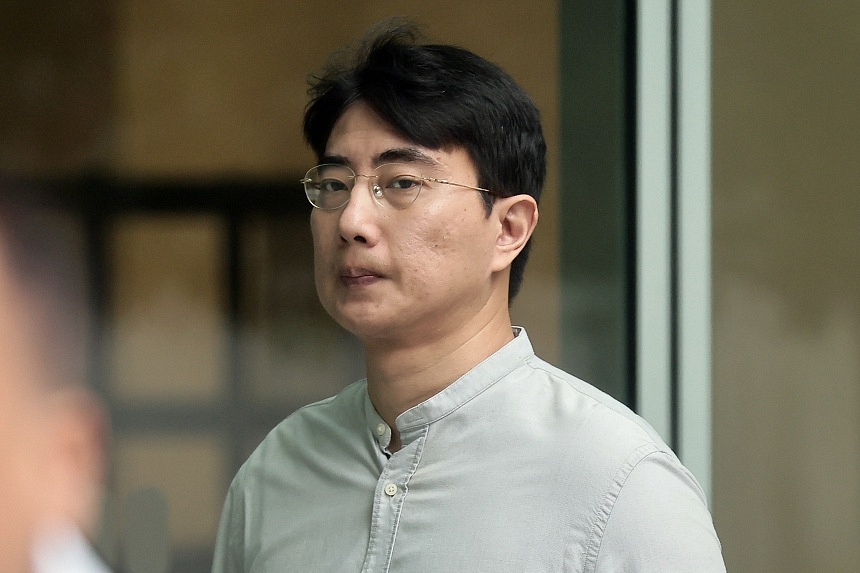SINGAPORE - A man, whose then employer was linked to a 2017 building fire in Toh Guan Road that killed a woman, duped three contractors of other buildings into believing that the cladding he sold them had fire-safety certification.
Cladding is used to cover the exteriors of buildings, and the current case involved aluminium composite panels (ACPs).
Stressing that Benny Phua Chia Ping’s court case does not centre on the cause or immediate consequences of the fatal blaze, the prosecution said: “(The incident) kicked off a chain of investigations by the Singapore Civil Defence Force (SCDF) and the Singapore Police Force (SPF) into the supplier of the ACPs installed there – Chip Soon Aluminium.”
On Sept 10, Deputy Public Prosecutor Alexandria Shamini Joseph urged the court to sentence the 45-year-old Singaporean to between 36 and 40 months’ jail.
Defence lawyer Favian Kang pleaded for his client to be given not more than 20 months’ jail.
Phua’s cheating charges relate to three firms – HB Glass and Aluminium, Mantec Holdings and Nam Lee Pressed Metals – that were not involved in the fire tragedy.
At the time of the offences, Phua was a manager at Chip Soon.
DPP Joseph told District Judge Christopher Goh that Phua’s cheating charges involved more than $200,000 in total and that he had subverted the Government’s fire safety regulatory framework.
Mr Kang, however, said that Phua had not defrauded any government agencies, and that his client did not derive any financial gains from his offences.
Judge Goh had earlier convicted Phua of five counts of cheating after a trial.
In their submissions, DPPs Jiang Ke Yue and Joseph said that an ACP is a popular material used for cladding on external walls.
It is also a fire-safety product regulated by the SCDF under the Product Listing Scheme to ensure safety, reliability and performance standards.
Under the Product Listing Scheme, an ACP supplier must obtain a fire-safety certificate of conformity (COC) from a firm called TUV SUV PSB (PSB), before it can supply ACPs to be used as cladding.
The COC certifies that this particular model of ACP meets the minimum fire-safety requirements.
The prosecution said that SCDF’s investigation into the fatal building fire pointed to the ACPs installed on the exterior as having contributed to the fire spreading up the building facade more rapidly.
Chip Soon was then ascertained to be the supplier of the panels.
The SCDF conducted an investigation due to concerns that other buildings which used Chip Soon’s ACPs might also be a fire hazard, and the police also looked into the firm’s business.
The DPPs said that a police investigation revealed that between April 24 and June 20, 2013, Phua was directly involved in selling ACPs to HB Glass and Aluminium, Mantec Holdings and Nam Lee Pressed Metals.
HB Glass and Aluminium used Chip Soon’s panels for Temasek Polytechnic West Wing in Tampines Avenue 1.
Mantec Holdings used Chip Soon’s panels for the VDL Building in Jalan Ahmad Ibrahim, while Nam Lee Pressed Metals used the panels in two three-storey ventilation buildings at the Marina Coastal Expressway.
The prosecution said: “SPF’s investigations determined that when the ACPs were ordered, Chip Soon did not have the required fire-safety certification for the panels supplied.
“The fire-safety certification had, in fact, been terminated on April 5, 2013, as it had failed two fire-safety tests.”
According to court documents, SCDF also collected samples of the ACPs installed on the exterior facade of each of the affected buildings and tests revealed the panels had failed to meet fire-safety requirements.
The DPPs said that Phua had a dishonest intention when he accepted five orders from the three companies without informing them the COC had been terminated.
According to the defence, Phua did not know that a valid COC was required for the sale to take place under the Product Listing Scheme.
He had also stated that he did not know that the victims’ orders for ACPs were for the facades of the affected buildings.
Phua is expected to be sentenced on Sept 30.


